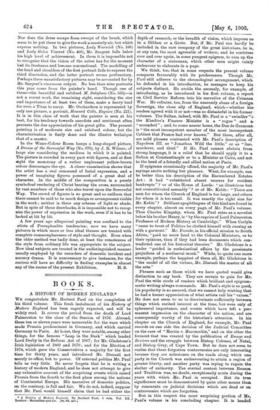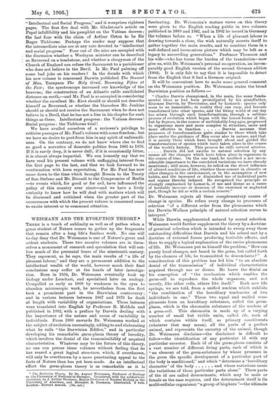BOOKS.
A HISTORY OF MODERN ENGLAND.*
WE congratulate Mr. Herbert Paul on the completion of his third volume. This fresh instalment of his History of Modern England has been eagerly expected, and will be widely read. It covers the period from the death of Lord Palmerston to the close of the Session of 1876. Abroad, these ten or eleven years were memorable for the wars which made Prussia predominant in Germany, and which carried Germany to Paris. At home, they were notable, among other things, for the famous "Leap in the Dark" which landed Lord Derby in the Reform Act of 1867; for Mr. Gladstone's Irish legislation of 1869 and 1870; and for the Election of 1874, which gave the Conservatives a majority for the first time for thirty years, and introduced Mr. Disraeli not merely to office, but to power. Of external politics Mr. Paul tells us very little. He never forgets that he is writing a history of modern England, and he does not attempt to give any exhaustive account of the surprising events which raised Prussia from the fourth to the first place among the nations of Continental Europe. His narrative of domestic politics, on the contrary, is full and fair. We do not, indeed, suppose that Mr. Paul, would himself claim that he had either the depth of research, or the breadth of vision, which impress us in a Gibbon or a Grote. But, if Mr. Paul can hardly be included in the rare company of the great historians, he is, at any rate, the most agreeable of writers ; and he contrives over and over again, in some pungent epigram, to sum up the character of a statesman, which other men might vainly endeavour to elaborate in a page.
We think, too, that in some respects the present volume compares favourably with its predecessors. Though Mr. Paul still adheres to the chronological arrangement, which he defended in his introduction, he manages to keep his subjects distinct. He avoids the anomaly, for example, of introducing, as he introduced in his first volume, a report on Civil Service Reform into his narrative of the Crimean War. He refrains, too, from the unseemly abuse of a foreign Sovereign, the close ally of England, which—whether his. readers agreed with it or not—was so distasteful in his former volumes. The Sultan, indeed, with Mr. Paul is a " swindler " the Khedive's Finance Minister is a " rogue " and a. " scoundrel" ; and, to come nearer home, the Due de Gramont- is " the most incompetent member of the most incompetent. Cabinet that France had ever known." But these, after all, are mild phrases contrasted with Mr. Paul's description of Napoleon III. as " Jonathan Wild the little," or as " liar, murderer, and thief." If Mr. Paul cannot abstain from strong language, it is a relief that he should apply it to a Sultan at Constantinople or to a Minister at Cairo, and not to the head of a friendly and allied nation at Paris.
If epigrams occasionally offend, the majority of Mr. Paul's sayings excite nothing but pleasure. What, for example, can be better than his description of the Encumbered Estates Act : it had " substituted absent usurers for resident bankrupts" ? or of the House of Lords: "an illustrious but not overcultivated assembly " ? or of Mr. Keble " There are men for whom the Church of England is too large, and others for whom it is too small. It was exactly the right size for Mr. Keble" ? Brilliant apophthegms of this kind are found in. every chapter, almost on every page, of Mr. Paul's volume. Thus Charles Kingsley, whom Mr. Paul rates as a novelist below his brother Henry, is " by the caprice of Lord Palmerston Professor of Modern History. at Cambridge." When Carlyle " came to treat of Politics he clothed himself with cursing as with a garment." Mr. Froude, in his official, mission to South. Africa, "paid. no more heed to the Colonial Ministers, or to, their opinions, than if they had been documents which con- tradicted one of his historical theories." Mr. Gladstone is a leader "guided in ecclesiastical affairs by the passionate• prejudices of a mediaeval monk." While, to quote one more example, perhaps the happiest of them all, Mr. Gladstone is. " the model of all the virtues, Mr. Disraeli the master of all the arts."
Phrases such as those which we have quoted would give distinction to any book. They are certain to gain for Mr. Paul the wide circle of readers which brilliant and epigram- matic writing always commands. Mr. Paul's style is so good, his popularity is so assured, that we cannot help wishing that he had a keener appreciation of what artists call his " values." He does not seem to us to discriminate sufficiently between things which excited interest at the time, but were only of ephemeral importance, and events which have left a per- manent impression on the character of the nation, and are consequently worthy of the historian's attention. In his chapter on the Church of gngland, for example, Mr. Paul records on one side the decision of the Judicial Committee on the case of " Martin v. Maconochie," and on the other the ferment that was created by the publication of Essays and Reviews and the struggle between Bishop Colenso, of Natal, and Bishop Gray, of Cape Town. But he does not seem to realise that these forgotten controversies are only interesting because they are milestones on the roads along which one party in the Church was endeavouring to attain a region of greater liberty, and, another party was trying to regain the shelter of authority. The eternal contest between Reason. and Tradition was, no doubt, exceptionally acute during the years with which. _Mr.. Paul de occupied.. But its tree significance must be demonstrated by quite other means than by comments on judicial decisions which are dead or on controversies which are forgotten. "Intellectual and. Social Progress," and it comprises eighteen pages. The first five deal with Mr. Gladstone's article on Papal infallibility and his pamphlet on the Vatican decrees ; the last four with the claim of Arthur Orton to be Sir Roger Tichborne. Perhaps the reader may suppose that the intermediate nine are at any rate devoted to " intellectual and social progress." Four out of the nine are occupied with the discussion whether a Wesleyan minister can be described as Reverend on a tombstone, and whether a clergyman of the Church of England can refuse the Sacrament to a parishioner who does not believe in the DeviL Is Mr. Paul palming off some bad joke on his readers ? In the decade with which his new volume is concerned Darwin published The Descent of Man, Tennyson The Holy Grail, Browning Fifine at the Fair; the spectroscope increased our knowledge of the heavens; the construction of an Atlantic cable annihilated distance on earth,—and Mr. Paul is so occupied in considering -whether the excellent Mr. Keet should or should not describe himself as Reverend, or whether the blameless Mr. Jenkins should or should not receive the Sacrament when he does not believe in a Devil, that he has not a line in his chapter for such things as these. Intellectual progress : the Vatican decrees! Social progress : the Tichborne trial!
We have availed ourselves of a reviewer's privilege to criticise passages of Mr. Paul's volume with some freedom ; but we have no desire to part from him in any spirit of unfriendli- ness. On the contrary, we do not know where else to find so good a narrative of domestic politics from 1865 to 1876. If it is rarely deep, it is never dull; if it is occasionally bitter, it is almost always impartial. We can honestly say that we have read his present volume with unflagging interest from the first page to the last, and that we look forward to its continuation with keen expectation. For Mr. Paul has now come down to the time which brought Russia to the Treaty of San Stefano and Mr. Disraeli to the Compromise of Berlin —to events which, for good or for evil, have influenced the policy of this country ever since—and we have a lively curiosity to know how he will deal with matters which will be discussed and criticised when the greater part of the occurrences with which the present volume is concerned cease to excite interest or to command attention.











































 Previous page
Previous page